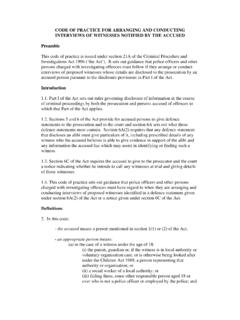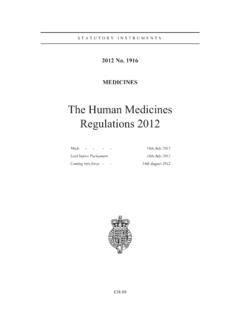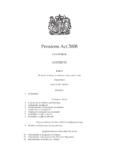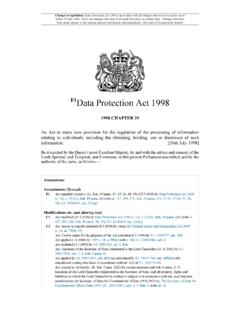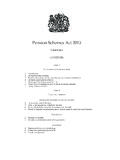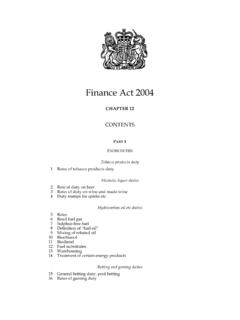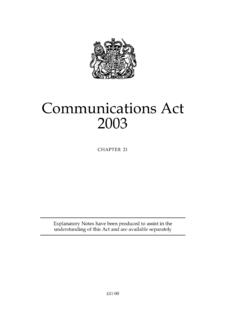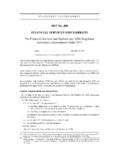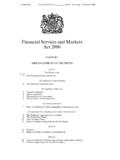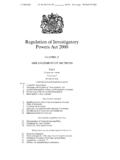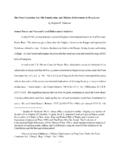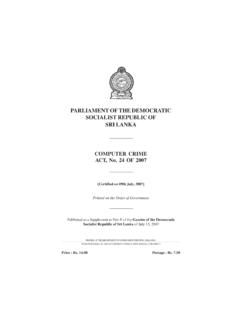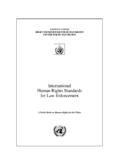Transcription of EXPLANATORY NOTES Investigatory Powers Act 2016
1 EXPLANATORY NOTES . Investigatory Powers Act 2016 . Chapter 25. Investigatory Powers ACT 2016 . EXPLANATORY NOTES . What these NOTES do These EXPLANATORY NOTES relate to the Investigatory Powers Act 2016 (c. 25) which received Royal Assent on 29 November 2016 . These EXPLANATORY NOTES have been prepared by the Home Office in order to assist the reader in understanding the Act. They do not form part of the Act and have not been endorsed by Parliament. These EXPLANATORY NOTES explain what each part of the Act will mean in practice; provide background information on the development of policy; and provide additional information on how the Act will affect existing legislation in this area. These EXPLANATORY NOTES might best be read alongside the Act. They are not, and are not intended to be, a comprehensive description of the Act. So where a provision of the Act does not seem to require any explanation or comment, the NOTES simply say in relation to it that the provision is self- EXPLANATORY .
2 C. 25 EN. Table of Contents Subject Page of these NOTES Overview of the Act 9. Policy background 9. Legal background 11. European law 12. Territorial extent and application 12. Commentary on provisions of Act 13. Part 1: General Privacy Protections 13. Section 1: Overview of the Act 13. Section 2: General duties in relation to privacy 13. Section 3: Offence of unlawful interception 13. Section 4: Definition of interception etc. 14. Section 5: Conduct that is not interception 15. Section 6: Definition of lawful authority 15. Section 7: Monetary penalties for certain unlawful interceptions 15. Schedule 1: Monetary Penalty Notices 15. Section 8: Civil liability for certain unlawful interceptions 16. Section 9: Restrictions on requesting interception by overseas authorities 16. Section 10: Restriction on requesting assistance under mutual assistance agreements etc. 16. Section 11: Offence of unlawfully obtaining communications data 16.
3 Section 12: Abolition or restriction of certain Powers to obtain communications data 16. Schedule 2: Abolition of disclosure Powers 17. Section 13: Mandatory use of equipment interference warrants 17. Section 14: Restriction on use of section 93 of the Police Act 1997 17. Part 2: Lawful interception of communications 17. Chapter 1: interception and examination with a warrant 17. Section 15: Warrants that may be issued under this Chapter 18. Section 16: Obtaining secondary data 18. Section 17: Subject-matter of warrants 19. Section 18: Persons who may apply for issue of a warrant 19. Section 19: power of Secretary of State to issue warrants 19. Section 20: Grounds on which warrants may be issued by Secretary of State 19. Section 21: power of Scottish Ministers to issue warrants 20. Section 22: "Relevant Scottish applications" 20. Section 23: Approval of warrants by Judicial Commissioners 20. Section 24: Approval of warrants issued in urgent cases 20.
4 Section 25: Failure to approve warrant issued in urgent case 21. Section 26: Members of Parliament etc. 21. Section 27: Items subject to legal privilege 21. Section 28: Confidential journalistic material 22. Section 29: Sources of journalistic information 22. These EXPLANATORY NOTES relate to the Investigatory Powers Act 2016 (c. 25) which received Royal Assent on 29. November 2016 . 2. Section 30: Decisions to issue warrants to be taken personally by Ministers 22. Section 31: Requirements that must be met by warrants 22. Section 32: Duration of warrants 23. Section 33: Renewal of warrants 23. Section 34: Modification of warrants 23. Section 35: Persons who may make modifications 23. Section 36: Further provision about modifications 23. Section 37: Notification of major modifications 24. Section 38: Approval of major modifications made in urgent cases 24. Section 39: Cancellation of warrants 25. Section 40: Special rules for certain mutual assistance warrants 25.
5 Section 41: Implementation of warrants 25. Section 42: Service of warrants outside the United Kingdom 25. Section 43: Duty of operators to assist with implementation 25. Chapter 2: Other forms of lawful interception 25. Section 44: interception with the consent of the sender or recipient 26. Section 45: interception by providers of postal or telecommunications services 26. Section 46: interception by businesses etc. for monitoring and record-keeping purposes 26. Section 47: Postal services: interception for enforcement purposes 26. Section 48: interception by Ofcom in connection with wireless telegraphy 27. Section 49: interception in prisons 27. Section 50: interception in psychiatric hospitals etc. 27. Section 51: interception in immigration detention facilities 27. Section 52: interception in accordance with overseas requests 27. Chapter 3: Other provisions about interception 27. Section 53: Safeguards relating to retention and disclosure of material 27.
6 Section 54: Safeguards relating to disclosure of information overseas 28. Section 55: Additional safeguards for items subject to legal privilege 28. Section 56: Exclusion of matters from legal proceedings etc. 28. Schedule 3: Exceptions to section 56 28. Section 57: Duty not to make unauthorised disclosures 30. Section 58: Section 57: meaning of excepted disclosure 30. Section 59: Offence of making unauthorised disclosures 31. Section 60: Part 2: interpretation 31. Part 3: Authorisations for obtaining communications data 31. Section 61: power to grant authorisations 31. Section 62: Restrictions in relation to internet connection records 31. Section 63: Additional restrictions on grant of authorisations 32. Section 64: Procedure for authorisations and authorised notices 33. Section 65: Duration and cancellation of authorisations and notices 33. Section 66: Duties of telecommunications operators in relation to authorisations 33.
7 Section 67: Filtering arrangements for obtaining data 33. Section 68: Use of filtering arrangements in pursuance of an authorisation 34. Section 69: Duties in connection with operation of filtering arrangements 35. Section 70: Relevant public authorities and designated senior officers 36. Schedule 4: Relevant public authorities 36. Section 71: power to modify section 70 and Schedule 4 37. Section 72: Certain regulations under section 71: supplementary 37. Section 73: Local authorities as relevant public authorities 37. Section 74: Requirement to be party to collaboration agreement 37. Section 75: Judicial approval for local authority authorisations 38. Section 76: Use of a single point of contact 38. Section 77: Commissioner approval for authorisations to identify or confirm journalistic sources 38. Sections 78 and 79: Collaboration agreements 39. These EXPLANATORY NOTES relate to the Investigatory Powers Act 2016 (c. 25) which received Royal Assent on 29.
8 November 2016 . 3. Section 80: Police collaboration agreements 39. Section 81: Lawfulness of conduct authorised by this Part 39. Section 82: Offence of making unauthorised disclosure 39. Section 83: Certain transfer and agency arrangements with public authorities 39. Schedule 5: Transfer and agency arrangements with public authorities: further provisions 39. Section 84: Applications of Part 3 to postal operators and postal services 40. Section 85: Extra-territorial application of Part 3 40. Section 86: Part 3: interpretation 40. Part 4: Retention of communications data 40. Section 87: Powers to require retention of certain data 40. Section 88: Matters to be taken into account before giving retention notices 41. Section 89: Approval of retention notices by Judicial Commissioners 41. Section 90: Review by the Secretary of State 42. Section 91: Approval of retention notices following review under section 90 42. Section 92: Data integrity and security 42.
9 Section 93: Disclosure of retained data 42. Section 94: Variation or revocation of notices 42. Section 95: Enforcement of notices and certain other requirements and restrictions 43. Section 96: Application of Part 4 to postal operators and postal services 43. Section 97: Extra-territorial application of Part 4 43. Section 98: Part 4: interpretation 43. Part 5: Equipment interference 43. Section 99: Warrants under this Part: general 43. Section 100: Meaning of equipment data 44. Section 101: Subject-matter of warrants 44. Section 102: power to issue warrants to intelligence services: the Secretary of State 45. Section 103: power to issue warrants to intelligence services: the Scottish Ministers 45. Section 104: power to issue warrants to the Chief of Defence Intelligence 46. Section 105: Decision to issue warrants under sections 102 to 104 be taken personally by Ministers 46. Section 106: power to issue warrants to law enforcement officers 46.
10 Schedule 6: Issue of warrants under section 106 etc: table 47. Section 107: Restriction on issue of warrants to certain law enforcement officers 47. Section 108: Approval of warrants by Judicial Commissioners 48. Section 109: Approval of warrants issued in urgent cases 48. Section 110: Failure to approve warrant issued in urgent case 48. Section 111: Members of Parliament etc. 49. Section 112: Items subject to legal privilege 49. Section 113: Confidential Journalistic Material 50. Section 114: Sources of Journalistic Information 50. Section 115: Requirements which must be met by warrants 50. Section 116: Duration of warrants 50. Section 117: Renewal of warrants 50. Section 118: Modifications of warrants issued by the Secretary of State or Scottish Ministers 51. Section 119: Persons who may make modifications under section 118 51. Section 120: Further provision about modifications under section 118 51. Section 121: Notification of modifications 52.
